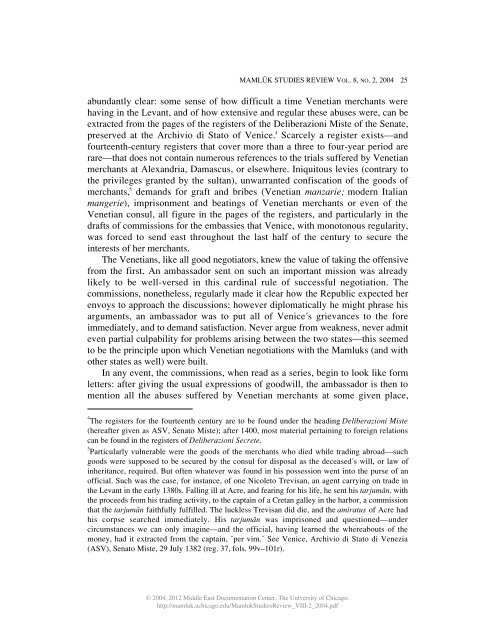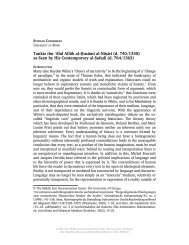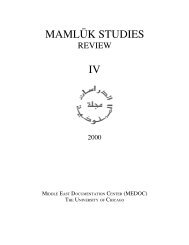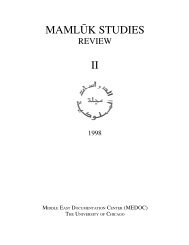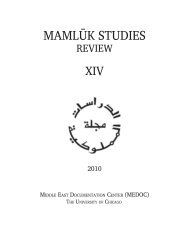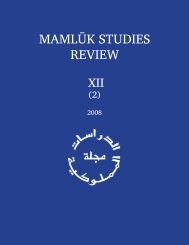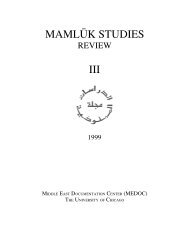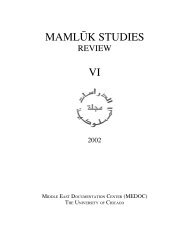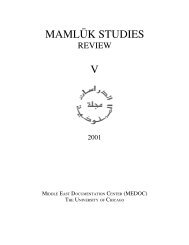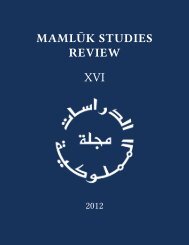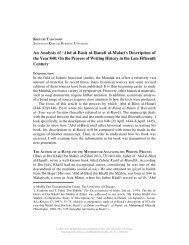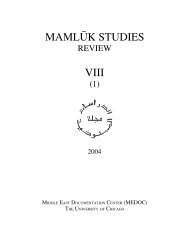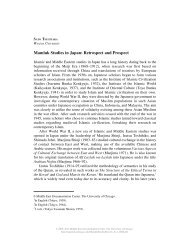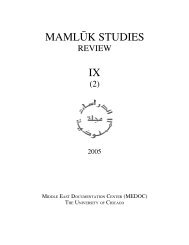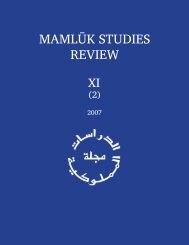Vol. VIII, no. 2 (2004) - Mamluk Studies Review - University of Chicago
Vol. VIII, no. 2 (2004) - Mamluk Studies Review - University of Chicago
Vol. VIII, no. 2 (2004) - Mamluk Studies Review - University of Chicago
Create successful ePaper yourself
Turn your PDF publications into a flip-book with our unique Google optimized e-Paper software.
MAMLU±K STUDIES REVIEW VOL. 8, NO. 2, <strong>2004</strong> 25<br />
abundantly clear: some sense <strong>of</strong> how difficult a time Venetian merchants were<br />
having in the Levant, and <strong>of</strong> how extensive and regular these abuses were, can be<br />
extracted from the pages <strong>of</strong> the registers <strong>of</strong> the Deliberazioni Miste <strong>of</strong> the Senate,<br />
preserved at the Archivio di Stato <strong>of</strong> Venice. 4 Scarcely a register exists—and<br />
fourteenth-century registers that cover more than a three to four-year period are<br />
rare—that does <strong>no</strong>t contain numerous references to the trials suffered by Venetian<br />
merchants at Alexandria, Damascus, or elsewhere. Iniquitous levies (contrary to<br />
the privileges granted by the sultan), unwarranted confiscation <strong>of</strong> the goods <strong>of</strong><br />
merchants, 5 demands for graft and bribes (Venetian manzarie; modern Italian<br />
mangerie), imprisonment and beatings <strong>of</strong> Venetian merchants or even <strong>of</strong> the<br />
Venetian consul, all figure in the pages <strong>of</strong> the registers, and particularly in the<br />
drafts <strong>of</strong> commissions for the embassies that Venice, with mo<strong>no</strong>to<strong>no</strong>us regularity,<br />
was forced to send east throughout the last half <strong>of</strong> the century to secure the<br />
interests <strong>of</strong> her merchants.<br />
The Venetians, like all good negotiators, knew the value <strong>of</strong> taking the <strong>of</strong>fensive<br />
from the first. An ambassador sent on such an important mission was already<br />
likely to be well-versed in this cardinal rule <strong>of</strong> successful negotiation. The<br />
commissions, <strong>no</strong>netheless, regularly made it clear how the Republic expected her<br />
envoys to approach the discussions: however diplomatically he might phrase his<br />
arguments, an ambassador was to put all <strong>of</strong> Venice's grievances to the fore<br />
immediately, and to demand satisfaction. Never argue from weakness, never admit<br />
even partial culpability for problems arising between the two states—this seemed<br />
to be the principle upon which Venetian negotiations with the <strong>Mamluk</strong>s (and with<br />
other states as well) were built.<br />
In any event, the commissions, when read as a series, begin to look like form<br />
letters: after giving the usual expressions <strong>of</strong> goodwill, the ambassador is then to<br />
mention all the abuses suffered by Venetian merchants at some given place,<br />
4 The registers for the fourteenth century are to be found under the heading Deliberazioni Miste<br />
(hereafter given as ASV, Senato Miste); after 1400, most material pertaining to foreign relations<br />
can be found in the registers <strong>of</strong> Deliberazioni Secrete.<br />
5 Particularly vulnerable were the goods <strong>of</strong> the merchants who died while trading abroad—such<br />
goods were supposed to be secured by the consul for disposal as the deceased's will, or law <strong>of</strong><br />
inheritance, required. But <strong>of</strong>ten whatever was found in his possession went into the purse <strong>of</strong> an<br />
<strong>of</strong>ficial. Such was the case, for instance, <strong>of</strong> one Nicoleto Trevisan, an agent carrying on trade in<br />
the Levant in the early 1380s. Falling ill at Acre, and fearing for his life, he sent his tarjuma≠n, with<br />
the proceeds from his trading activity, to the captain <strong>of</strong> a Cretan galley in the harbor, a commission<br />
that the tarjuma≠n faithfully fulfilled. The luckless Trevisan did die, and the amiratus <strong>of</strong> Acre had<br />
his corpse searched immediately. His tarjuma≠n was imprisoned and questioned—under<br />
circumstances we can only imagine—and the <strong>of</strong>ficial, having learned the whereabouts <strong>of</strong> the<br />
money, had it extracted from the captain, "per vim." See Venice, Archivio di Stato di Venezia<br />
(ASV), Senato Miste, 29 July 1382 (reg. 37, fols. 99v–101r).<br />
© <strong>2004</strong>, 2012 Middle East Documentation Center, The <strong>University</strong> <strong>of</strong> <strong>Chicago</strong>.<br />
http://mamluk.uchicago.edu/<strong>Mamluk</strong><strong>Studies</strong><strong>Review</strong>_<strong>VIII</strong>-2_<strong>2004</strong>.pdf


